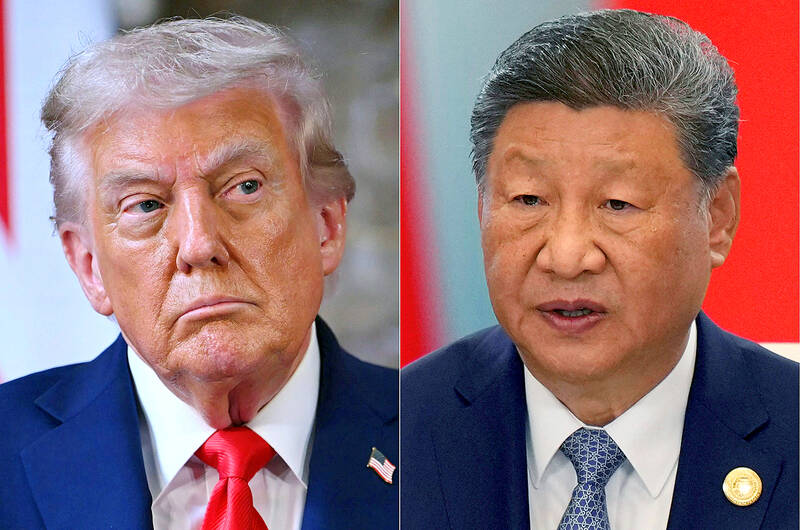US President Donald Trump hoped to finalize the fate of video-sharing app TikTok and make progress on trade talks in a phone call with Chinese President Xi Jinping (習近平) yesterday.
“I’m speaking with President Xi, as you know, on Friday, having to do with TikTok, and also trade,” Trump said on Thursday. “And we’re very close to deals on all of it. And my relationship with China is very good.”
International Crisis Group US-China relations expert Ali Wyne said that “each leader will aim to signal that he has outmaneuvered the other” in trade talks focused on tariffs.

Photo: AFP
The pair could settle the TikTok drama, after Trump repeatedly put off a ban to force Chinese parent company ByteDance to sell its US operations for national security reasons.
Under the deal, TikTok’s US business would be “owned by all American investors, and very rich people and companies,” Trump said.
He said he believes TikTok had boosted his appeal to younger voters and helped him win last year’s election.
The president on Tuesday again pushed back applying a ban on the app, which had been decided under former US president Joe Biden.
The Wall Street Journal raised the possibility of a consortium to control TikTok that would include tech giant Oracle and two California investment funds — Silver Lake and Andreessen Horowitz.
The telephone talks come as the world’s two biggest economies seek to find a compromise on tariffs.
Both sides dramatically hiked tariffs against each other during a months-long dispute earlier this year, disrupting global supply chains.
Washington and Beijing then reached a deal to reduce levies, which expires in November, with the US imposing 30 percent duties on imports of Chinese goods and China hitting US products with a 10 percent tariff.
Trump and Xi were still talking as of press time last night.

POLITICAL AGENDA: Beijing’s cross-strait Mid-Autumn Festival events are part of a ‘cultural united front’ aimed at promoting unification with Taiwan, academics said Local authorities in China have been inviting Taiwanese to participate in cross-strait Mid-Autumn Festival celebrations centered around ideals of “family and nation,” a move Taiwanese academics said politicizes the holiday to promote the idea of “one family” across the Taiwan Strait. Sources said that China’s Fujian Provincial Government is organizing about 20 cross-strait-themed events in cities including Quanzhou, Nanping, Sanming and Zhangzhou. In Zhangzhou, a festival scheduled for Wednesday is to showcase Minnan-language songs and budaixi (布袋戲) glove puppetry to highlight cultural similarities between Taiwan and the region. Elsewhere, Jiangsu Province is hosting more than 10 similar celebrations in Taizhou, Changzhou, Suzhou,

The Republic of China (ROC) is celebrating its 114th Double Ten National Day today, featuring military parades and a variety of performances and speeches in front of the Presidential Office in Taipei. The Taiwan Taiko Association opened the celebrations with a 100-drummer performance, including young percussionists. As per tradition, an air force Mirage 2000 fighter jet flew over the Presidential Office as a part of the performance. The Honor Guards of the ROC and its marching band also heralded in a military parade. Students from Taichung's Shin Min High School then followed with a colorful performance using floral imagery to represent Taiwan's alternate name

COGNITIVE WARFARE: Chinese fishing boats transmitting fake identification signals are meant to test Taiwan’s responses to different kinds of perceived incursions, a report said Chinese vessels are transmitting fake signals in Taiwan’s waters as a form of cognitive warfare, testing Taipei’s responses to various types of incursions, a report by the Institute for the Study of War said on Friday. Several Chinese fishing vessels transmitted fake automatic identification system (AIS) signals in Taiwan’s waters last month, with one mimicking a Russian warship and another impersonating a Chinese law enforcement vessel, the report said. Citing data from Starboard Maritime Intelligence, the report said that throughout August and last month, the Chinese fishing boat Minshiyu 06718 (閩獅漁06718) sailed through the Taiwan Strait while intermittently transmitting its own AIS

CHINESE INFILTRATION: Medical logistics is a lifeline during wartime and the reported CCP links of a major logistics company present a national security threat, an expert said The government would bolster its security check system to prevent China from infiltrating the nation’s medical cold chain, a national security official said yesterday. The official, who wished to stay anonymous, made the remarks after the Chinese-language magazine Mirror Media (鏡周刊) reported that Pharma Logistics (嘉里醫藥物流) is in charge of the medical logistics of about half of the nation’s major hospitals, including National Taiwan University Hospital and Taipei Veterans General Hospital. The company’s parent, Kerry TJ Logistics Co (嘉里大榮物流), is associated with the National Committee of the Chinese People’s Political Consultative Conference (CPPCC) and the Chinese People’s Liberation Army (PLA), the